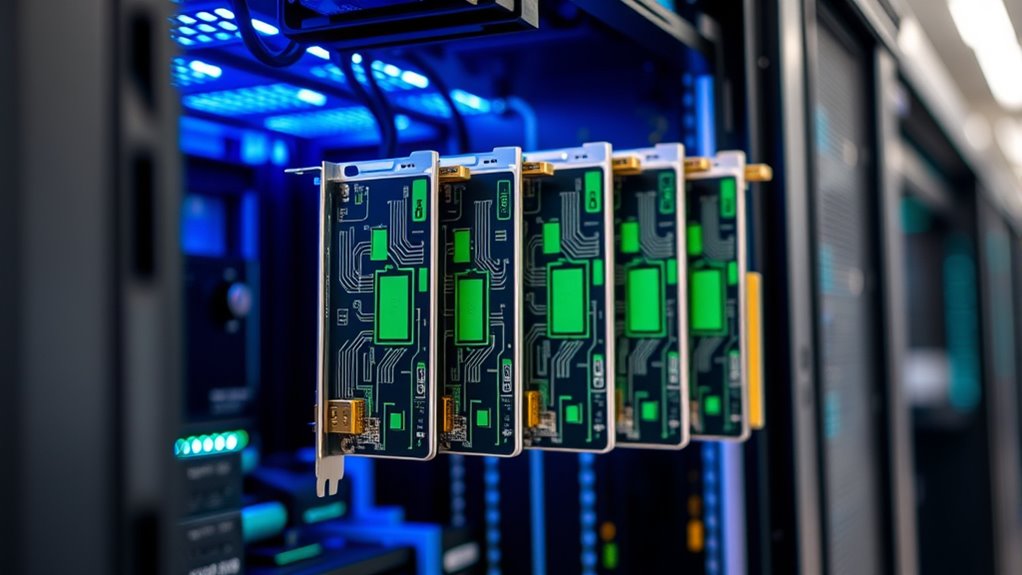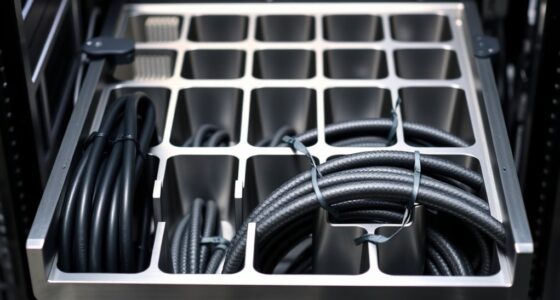If you’re looking for the best PCIe fiber channel cards for high-performance storage in 2025, I recommend considering options like the QLogic QLE2564, Emulex LPE12002, and ATTO Celerity FC 81EN, which deliver enterprise-grade speed, reliability, and scalability. Factors like port count, transfer speeds, compatibility with your system, and the right fiber connectors are key. Stay with me to explore the top models and what makes them ideal for demanding storage environments.
Key Takeaways
- Focus on cards supporting 8Gb, 16Gb, or 32Gb fibre channel speeds for future-ready high-performance storage.
- Prioritize models with dual or multiple ports for redundancy and increased bandwidth.
- Ensure compatibility with PCIe 3.0/4.0 slots and various operating systems like Windows, Linux, and VMware.
- Look for enterprise-grade build quality, robust warranty, and reliable management tools.
- Consider cards with multi-mode fibre support, SFP+ transceivers, and high throughput per port (up to 14.025 GB/s).
10Gtek 10Gb PCI-E NIC Network Card
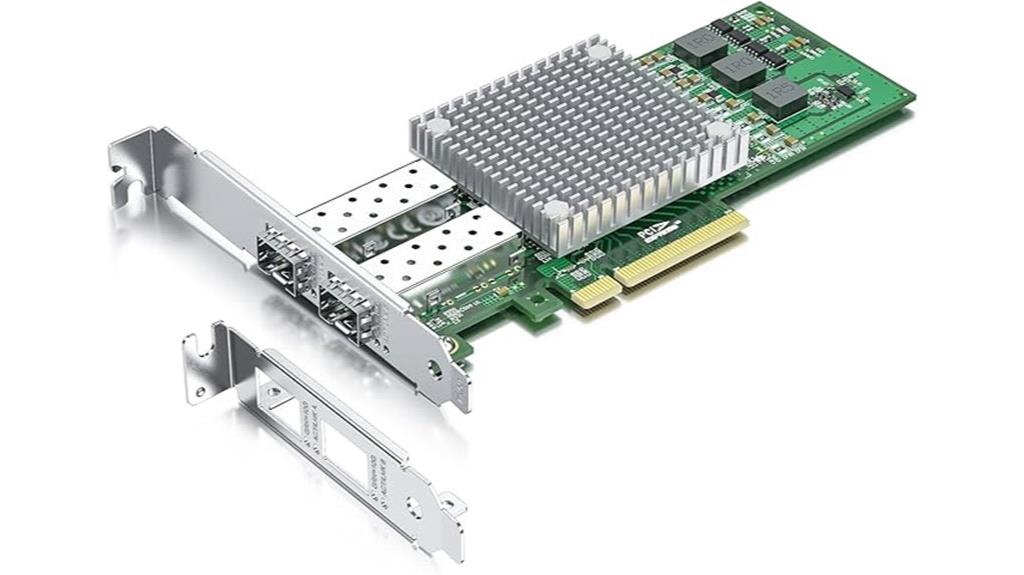
The Gtek 10Gb PCI-E NIC Network Card is an excellent choice for those seeking high-speed, reliable network connectivity in data centers, small offices, or home labs. It features Broadcom BCM57810S and Intel X540 chipsets, supporting 10Gbps speeds via dual SFP+ or RJ45 ports. Compatible with Windows Server, Linux distributions, VMware, and more, it’s designed for versatile networking needs. With PCIe 2.0 x8 compatibility, it fits various motherboards. Its robust build delivers outstanding performance for fiber, NAS, or remote access tasks. While driver setup can be tricky, the card’s high throughput, flexibility, and solid construction make it a valuable upgrade for demanding environments.
Best For: professionals and enthusiasts needing high-speed, reliable network connections for data centers, NAS setups, or high-performance home labs.
Pros:
- Supports 10Gbps speeds with dual SFP+ or RJ45 ports for flexible connectivity
- Compatible with a wide range of operating systems including Windows, Linux, and VMware
- Robust build quality with effective heat dissipation and durable components
Cons:
- Driver installation can be complex, especially on Windows 11 and Linux systems
- Not all models support hot-swapping, which may limit certain workflows
- Variability in product features and potential missing parts in resale or used units
TBS 6902 DVB-S/S2 Dual Tuner Satellite TV Card

If you want to watch and record multiple satellite channels simultaneously, the TBS 6902 DVB-S/S2 Dual Tuner Satellite TV Card is an excellent choice. It features two tuners, allowing you to view one channel while recording another from different satellites or transponders. Supporting Free-to-Air programs, DVB-S2, and high-speed data downloads up to 190 Mbps, it’s versatile for both TV viewing and data applications. Compatibility spans Windows and Linux systems, with PCIe connections and dual LNB ports. While setup can be complex and driver issues may arise, many users appreciate its ability to handle multiple streams once configured correctly.
Best For: users seeking to watch and record multiple satellite channels simultaneously with a versatile satellite TV card that supports FTA programs and high-speed data downloads.
Pros:
- Allows simultaneous viewing and recording of multiple satellite channels from different transponders or satellites.
- Supports high-speed satellite data downloads up to 190 Mbps with wide symbol rate support.
- Compatible with Windows and Linux systems, offering flexibility for various user setups.
Cons:
- Setup can be complex, often requiring driver recompilation and technical troubleshooting.
- Hardware fitment issues and limited support for certain functions like SNR measurement and software codecs.
- Customer support may be unresponsive, and software configuration can be challenging for beginners.
QLogic QLE2564 Fibre Channel HBA (8Gb Quad Port, PCIe 2.0)
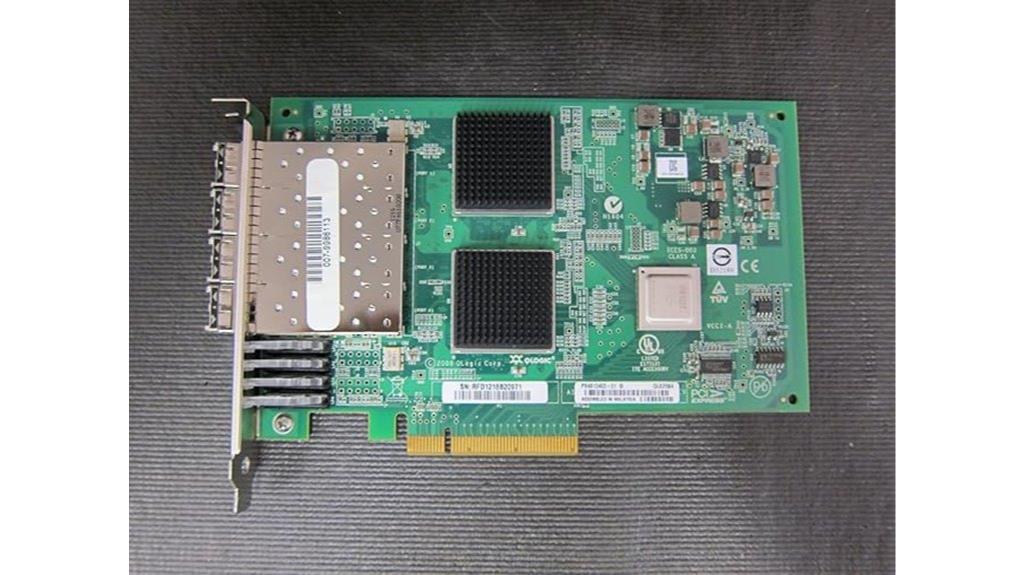
For enterprise data centers seeking high-speed, reliable SAN connectivity, the QLogic QLE2564 Fibre Channel HBA stands out with its quad-port design supporting 8 Gbps per port. This PCIe 2.0 x8 card offers four LC fibre ports that connect multi-mode fibre, ensuring fast data transfer and redundancy. It supports topology options like point-to-point and switched fabric, making it versatile for various SAN setups. Compatible with Windows, Linux, and Solaris, it’s ideal for connecting SANs to VMware hosts or enterprise servers. With a three-year warranty and positive customer feedback, the QLE2564 provides a dependable, high-performance solution for demanding storage environments.
Best For: enterprise data centers and IT professionals seeking high-speed, reliable SAN connectivity for VMware hosts and enterprise servers.
Pros:
- Supports four 8 Gbps fibre ports for high throughput and redundancy
- Compatible with Windows, Linux, and Solaris operating systems
- Designed for enterprise environments with a three-year warranty and positive user feedback
Cons:
- Requires PCIe 2.0 x8 slot, which may not be available in older servers
- Bulkier dimensions may require suitable space in server chassis
- Limited to fibre channel environments; not suitable for iSCSI or NAS connectivity
USB 2.0 External Sound Card for PC
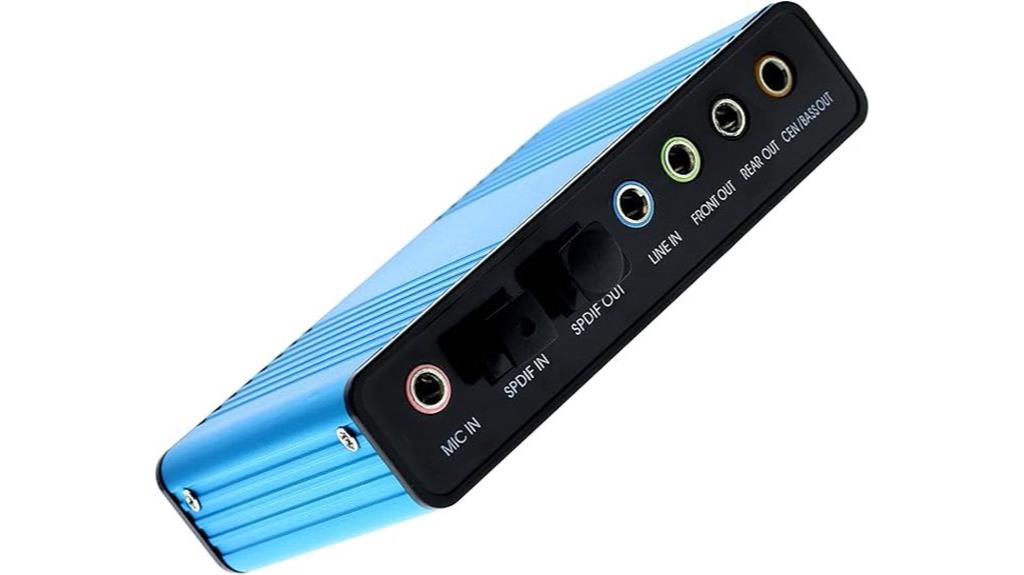
A USB 2.0 external sound card is an excellent choice for users who need a simple, portable audio solution without installing an internal sound card. It supports 6-channel 5.1 surround sound, making it ideal for movies and gaming. Compatible with various Windows OS versions, it allows digital and analog audio recording and playback. It handles multiple sampling rates—32kHz, 44.1kHz, and 48kHz—and supports digital inputs like SPDIF. For surround sound, it works with DTS 5.1 sources via fiber output, but proper decoders are essential. This device is perfect for upgrading audio without internal hardware modifications.
Best For: users seeking a portable, easy-to-install external sound solution for enhancing PC audio with surround sound capabilities.
Pros:
- Supports 6-channel 5.1 surround sound for immersive audio experiences.
- Compatible with multiple Windows OS versions, including Win98, XP, Vista, Win7, and 8.
- Offers digital and analog audio recording and playback with various sampling rates (32kHz, 44.1kHz, 48kHz).
Cons:
- Requires proper setup and compatible decoders for optimal surround sound performance.
- Does not decode fiber output signals internally; passthrough is dependent on external decoders.
- Only transmits R/L PCM audio in digital playback, limiting multi-channel digital output without external support.
PCIE X4 10GbE SFP+ Fiber Ethernet Adapter
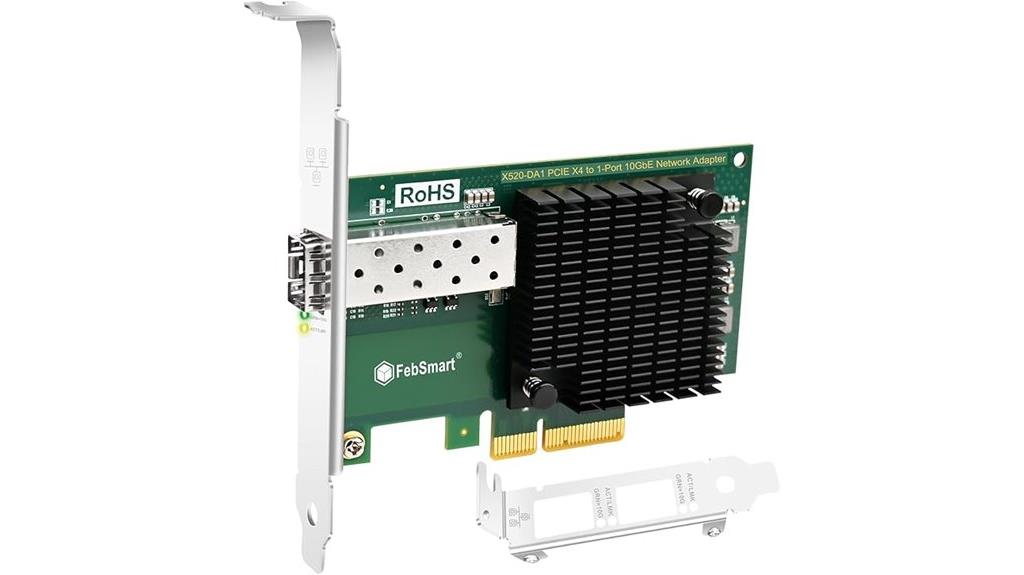
The PCIE X4 10GbE SFP+ Fiber Ethernet Adapter is an excellent choice for professionals and enthusiasts who need reliable, high-speed network connectivity in demanding environments. Built on the Intel 82599EN controller, it supports 10GbE fiber connections, including SFP+ transceivers and DAC cables. Compatible with Windows, Linux, and VMware, it offers seamless setup and robust performance. Its PCIe 2.0 X4 interface provides up to 40Gbps bandwidth, ensuring fast data transfers for storage, SAN, or LAN needs. Compact and versatile, it includes brackets for various system sizes. Many users praise its stability, easy installation, and value, making it ideal for high-performance networks.
Best For: professionals and enthusiasts who require reliable, high-speed 10GbE fiber network connectivity for demanding storage, SAN, or LAN environments.
Pros:
- Seamless compatibility with Windows, Linux, and VMware platforms for versatile deployment
- Supports up to 40Gbps total bandwidth via PCIe 2.0 X4 interface for fast data transfer
- Compact design with versatile brackets suitable for various system sizes and setups
Cons:
- Requires driver installation, which may be an extra step for some users
- Slightly higher power consumption compared to older or lower-speed NICs
- PCIe 2.0 interface offers less bandwidth compared to newer PCIe 3.0 or 4.0 standards
10Gb Open SFP+ PCI-e Network Card with Intel 82599 Controller

If you’re seeking a reliable 10GbE network solution that offers flexible connectivity options, the Gb Open SFP+ PCI-e Network Card with Intel 82599 Controller is an excellent choice. It supports a wide range of operating systems, including Windows, Linux, VMware, Solaris, and more, and fits into PCIe X4, X8, or X16 slots. With the Intel 82599EN chipset, it delivers data transfer speeds up to 10 Gbps, ensuring stable, high-performance network connections. The single SFP+ port supports various modules like DAC and AOC, meeting data center demands. Plus, it comes with a 180-day warranty and responsive customer support, making it a dependable, versatile option.
Best For: IT professionals and data centers seeking a high-speed, reliable 10GbE network connection with versatile compatibility and flexible module options.
Pros:
- Supports a wide range of operating systems including Windows, Linux, VMware, and Solaris.
- Delivers up to 10 Gbps data transfer speed with stable network performance.
- Compatible with PCIe X4, X8, and X16 slots for flexible installation.
Cons:
- Requires SFP+ modules (not included) for actual fiber or DAC connections.
- May involve a learning curve for configuring advanced network features.
- Limited to 180-day warranty, which might be shorter than some enterprise standards.
QNAP Qxp-16G2FC Fibre Channel Expansion Card
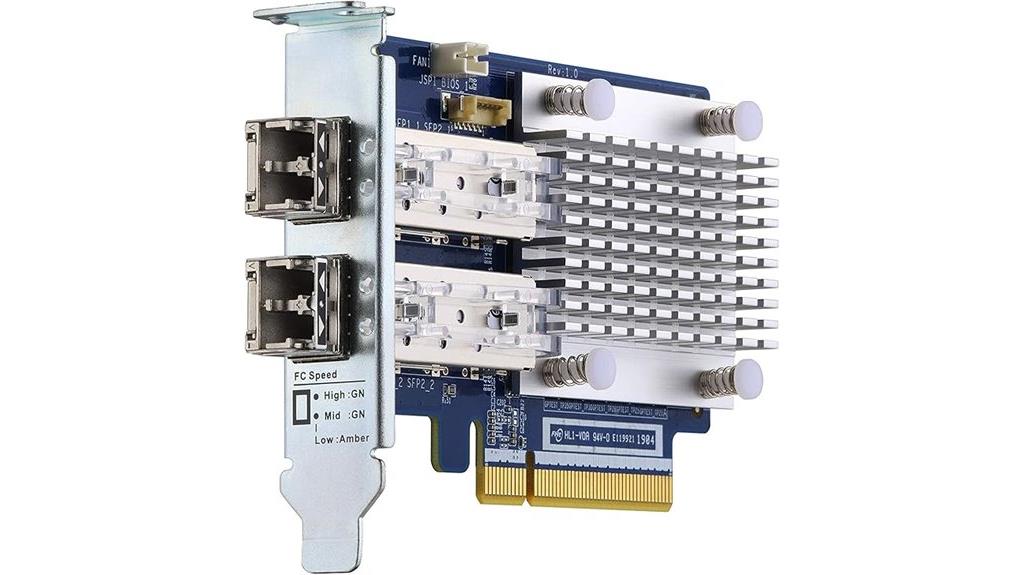
For enterprise storage environments demanding high-speed data transfer, the QNAP Qxp-16G2FC Fibre Channel Expansion Card stands out with its dual 16Gb Gen 5 fiber channel ports. It features two SFP+ transceivers supporting transmission rates up to 14.025 GB/s per port, ensuring rapid data access. Connecting via PCIe Gen3 x8, it’s compatible with Windows, macOS, and Linux. Despite limited reviews, it remains available from QNAP since 2019. Its compact, low-profile design makes it versatile for various server setups. This card is ideal for organizations seeking reliable, high-performance fiber channel connectivity, though user feedback suggests it’s worth researching further before purchase.
Best For: organizations seeking high-speed, reliable fiber channel connectivity for enterprise storage environments with compatible servers and storage arrays.
Pros:
- Supports high transmission rates up to 14.025 GB/s per port for rapid data transfer
- Compatible with Windows, macOS, and Linux, offering versatile integration options
- Compact, low-profile design suitable for various server configurations
Cons:
- Limited customer reviews with an average rating of 1.0 out of 5 stars
- Potential need for further research due to user feedback concerns
- May require technical expertise for installation and configuration
PCIE X8 2-Port 10GbE SFP+ Ethernet Adapter
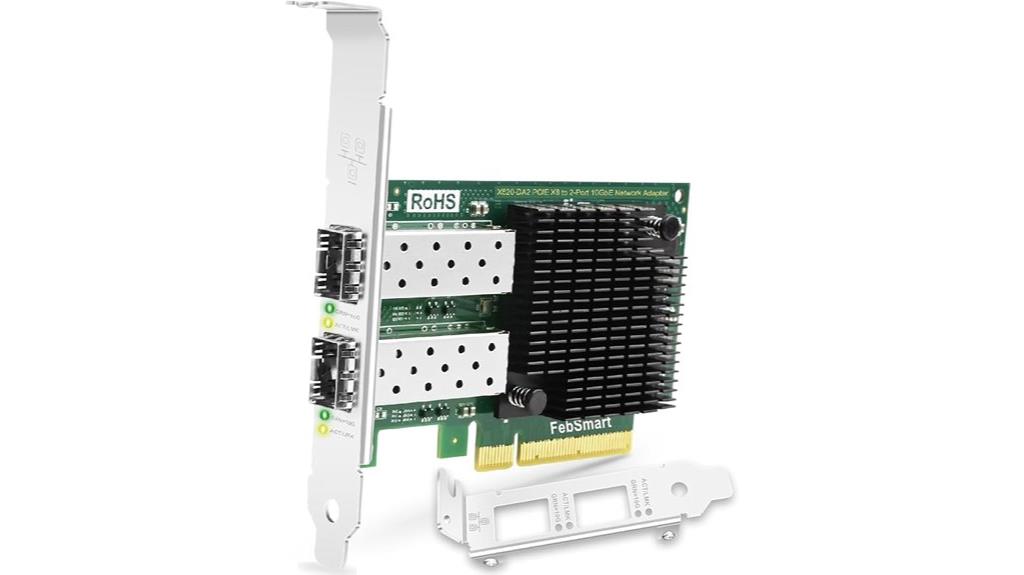
The PCIe X8 2-Port 10GbE SFP+ Ethernet Adapter is an excellent choice for data centers and virtualization environments that demand high-speed, reliable network connectivity. It features dual 10GbE SFP+ fiber ports based on the Intel 82599ES controller, supporting optical transceivers, SFP+ DAC cables, and speeds up to 10GbE. With a PCIe 2.0 X8 interface, it offers a total bandwidth of 40Gbps. Compatible with various operating systems, including Windows, Linux, and VMware, it provides advanced features like virtualization support, traffic management, and fiber channel over Ethernet. Its compact design suits both full-height and low-profile setups, ensuring versatile deployment options.
Best For: IT professionals and data centers seeking high-speed, reliable 10GbE network connectivity for virtualization, storage, and enterprise environments.
Pros:
- Supports dual 10GbE SFP+ fiber ports for flexible high-speed connections
- Compatible with a wide range of operating systems including Windows, Linux, and VMware
- Compact design with low-profile and full-height brackets for versatile deployment
Cons:
- Requires driver installation for Windows 7/8.x/10/11, which may add setup time
- Optical transceivers and SFP+ DAC cables are sold separately, increasing initial cost
- Optimal performance depends on proper slot configuration within the PCIe x8/x16 slots
QLogic QLE2462 PCIe HBA Fibre Channel Adapter

The QLogic QLE2462 PCIe HBA Fibre Channel Adapter stands out as an ideal choice for network administrators seeking reliable, high-performance connectivity in enterprise storage environments. This 4 GB Fibre Channel HBA features a PCIe interface with two ports, providing robust dual-channel connectivity. Since its release in 2013, it has maintained a strong presence in the market, ranking among the top internal networking cards. Its sturdy build, weighing just 2 pounds, ensures durability and ease of installation. With ongoing support and warranty options, the QLE2462 remains a dependable option for high-speed, enterprise-grade storage solutions well into 2025.
Best For: network administrators and IT professionals seeking reliable high-speed enterprise storage connectivity with a durable and easy-to-install Fibre Channel HBA.
Pros:
- High-performance 4 GB bandwidth with dual-port connectivity for robust data transfer.
- PCIe interface ensures compatibility with modern server hardware.
- Durable build and lightweight design facilitate straightforward installation and long-term reliability.
Cons:
- Discontinued model, which may limit availability of new units.
- Limited to 2 ports, which might not meet the needs of extremely high-density environments.
- No recent updates or features beyond its initial 2013 release.
New – QLogic QLE2562 Fibre Channel Host Bus Adapter – BX7067

If you’re looking to upgrade your data center with reliable, high-performance connectivity, the QLogic QLE2562 Fibre Channel Host Bus Adapter stands out as an excellent choice. It features next-generation 8Gb FC technology, boosting security, QoS, and supporting dynamic provisioning for flexible storage management. Compact and easy to install, it’s compatible with Dell servers and connects SAN components via copper cables or optical transceivers. With a high customer rating of 4.6 stars, it’s known for seamless integration and dependable performance. Although it doesn’t include SFP modules, replacements are readily available. Overall, the QLE2562 offers a robust, future-proof upgrade for demanding enterprise storage environments.
Best For: enterprises seeking a reliable, high-performance Fibre Channel host bus adapter compatible with Dell servers for flexible and secure SAN connectivity.
Pros:
- Supports next-generation 8Gb FC technology for fast data transfer
- Easy to install and seamlessly integrates with various storage devices
- High customer satisfaction with a 4.6-star rating and responsive support
Cons:
- Does not include SFP modules, requiring additional purchase
- Compatibility may vary with firmware versions across different part numbers
- Limited information on advanced management features or software tools
H!Fiber 10Gb SFP+ PCIe Network Card with Intel Chip
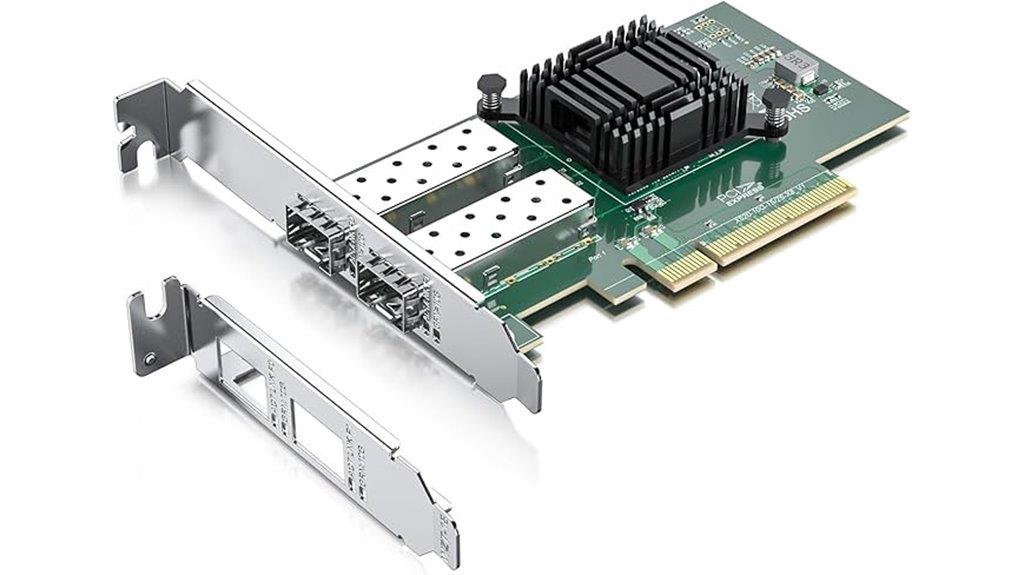
For professionals seeking reliable high-speed network connectivity, the H!Fiber 10Gb SFP+ PCIe Network Card with Intel Chip stands out with its use of the robust Intel 82599ES controller and dual SFP+ ports supporting 10G modules. It’s compatible with a wide range of operating systems, including Windows, Linux, FreeBSD, and VMware, making it versatile for various environments. The card delivers up to 10 Gbps throughput, with stable operation and excellent driver support. Easy to install in PCIe X8/X16 slots, it supports fiber, DAC, and AOC cables. While some limitations exist around maximum speeds, users praise its reliability and straightforward setup for high-performance storage and networking.
Best For: professionals and enterprises seeking reliable, high-speed 10GbE network solutions compatible with multiple operating systems and environments.
Pros:
- Supports up to 10 Gbps throughput with stable performance and reliable driver support
- Compatible with a wide range of OS including Windows, Linux, FreeBSD, and VMware
- Easy to install with versatile cable options (fiber, DAC, AOC) and full/low-profile brackets
Cons:
- Some users experience speed limitations around 3 Gbps due to chipset constraints
- Port failure and disconnections can occur after extended use in certain cases
- Maximum speed may be limited by the chipset, restricting full 10Gbps utilization
Emulex LPE12002 8Gb Dual Port Fibre Channel PCI-E FC HBA Adapter
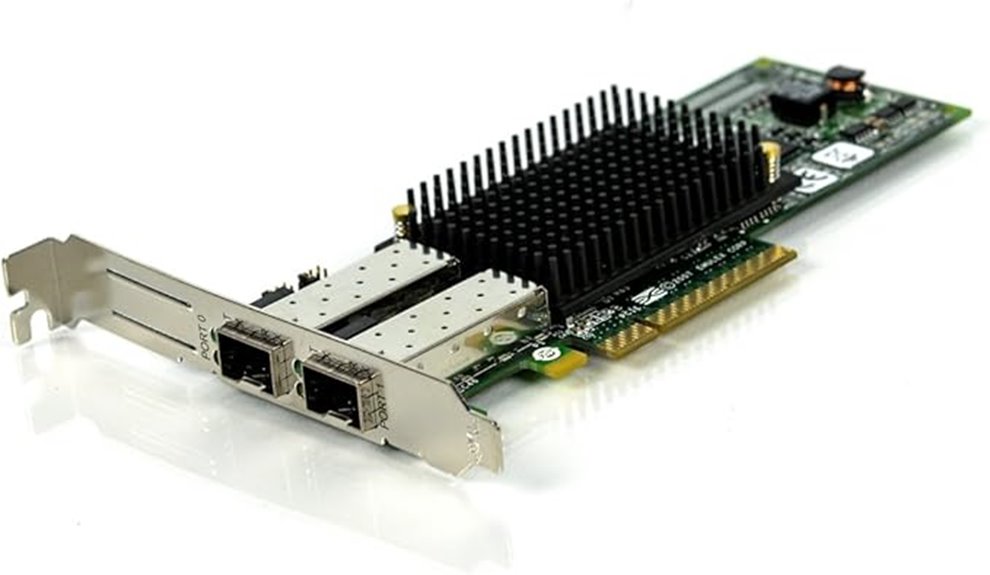
When selecting a PCIe Fiber Channel card for high-performance storage networks, the Emulex LPE12002 stands out with its dual 8Gb ports, delivering reliable and fast connectivity. This card supports 8Gb Fibre Channel, ensuring high-speed data transfer essential for demanding storage environments. Its compact size and lightweight design make installation straightforward. The adapter is in excellent used condition, backed by a 60-day warranty from a trusted seller, ensuring peace of mind. Since it’s still in stock and not discontinued, it remains a solid choice for those seeking dependable, high-performance Fibre Channel connectivity in their storage setups.
Best For: IT professionals and system builders seeking reliable, high-speed dual-port Fibre Channel connectivity for enterprise storage networks.
Pros:
- Supports 8Gb Fibre Channel for fast data transfer speeds
- Dual port design provides flexibility and redundancy
- Compact and lightweight, easy to install in various setups
Cons:
- Used condition may require testing before deployment
- Only compatible with PCI-E slot interfaces
- Limited to 8Gb speed, which may be lower than newer models with higher speeds
StarTech.com 7.1 Channel Sound Card (PEXSOUND7CH)

The StarTech.com PEXSOUND7CH 7.1 Channel Sound Card is an excellent upgrade for audiophiles and gamers seeking high-quality surround sound on their PCs. It supports 24-bit/192KHz playback and recording, delivering crisp, immersive audio for home theater, gaming, and professional use. With both digital optical (SPDIF) and analog outputs, it offers versatile connectivity to various audio devices. Installation is straightforward, with support for Windows XP through Windows 11, plus options for low-profile cases. While some users report driver and noise issues, overall, it provides solid sound quality and easy setup at an affordable price point.
Best For: audiophiles, gamers, and home theater enthusiasts seeking an affordable upgrade for high-quality surround sound on their PCs.
Pros:
- Supports high-definition 24-bit/192KHz playback and recording for superior audio quality
- Versatile connectivity options including digital optical (SPDIF) and analog outputs
- Easy to install with support for a wide range of Windows operating systems from XP to Windows 11
Cons:
- Some users experience driver compatibility issues, especially on Windows 10, requiring manual updates
- Lacks EMI/RFI shielding, which can lead to noise interference in high-electromagnetic environments
- Reports of hardware detection failures or audio distortion over time for certain users
ATTO Celerity FC 81EN Fibre Channel PCIe Host Bus Adapter
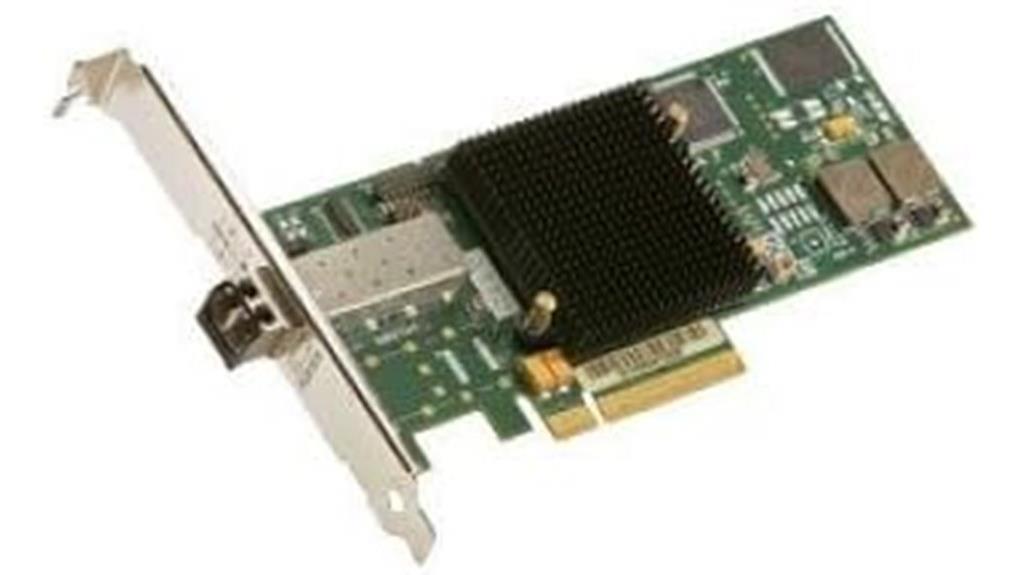
If you’re seeking a reliable Fibre Channel solution with high performance, the ATTO Celerity FC 81EN PCIe Host Bus Adapter is an excellent choice, especially for enterprise storage environments. It features a PCIe x8 interface supporting 8Gb Fibre Channel connectivity and includes an SFP module for fiber connections. Known for quality and reliability, this card delivers outstanding performance and value, ensuring 100% user satisfaction. Weighing just 14.4 ounces, it’s a compact yet powerful option from ATTO Technology. Since its launch in 2011, it remains a top contender for high-speed, dependable storage networking in demanding data centers.
Best For: enterprise IT professionals and data centers seeking a reliable, high-performance Fibre Channel host bus adapter for demanding storage networking applications.
Pros:
- Supports 8Gb Fibre Channel connectivity for fast data transfer
- Includes an SFP module for flexible fiber optic connections
- Compact design with a PCIe x8 interface for easy integration
Cons:
- Discontinued model may limit availability of new units
- Requires compatible PCIe x8 slot, which may not be available in all systems
- Limited to single-channel 8Gb connectivity, which may not meet future scalability needs
Factors to Consider When Choosing a PCIE Fiber Channel Card
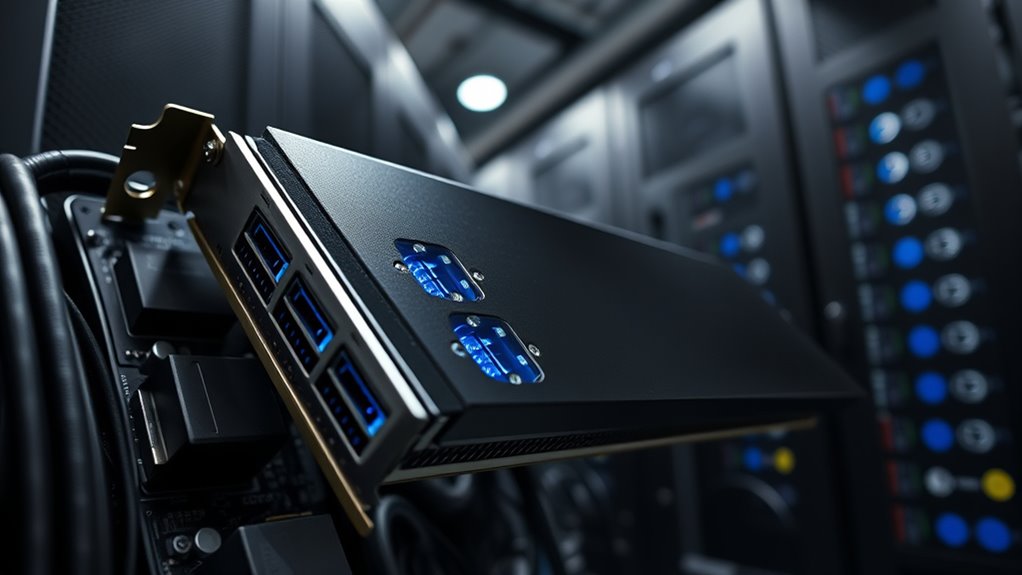
When selecting a PCIe Fiber Channel card, I focus on several key factors to guarantee it fits my system and needs. I consider compatibility, port count and speed, fiber optic support, interface, form factor, and driver requirements. These points help me choose a card that delivers reliable performance and seamless integration.
Compatibility With System
Choosing a PCIe fiber channel card requires guaranteeing it matches your system’s specific configuration. First, check that the card supports the same PCIe slot version as your motherboard—whether PCIe 3.0 or 4.0—to ensure proper compatibility. Next, verify the card’s physical form factor, like full-height or low-profile, so it fits within your chassis. Also, confirm your operating system has compatible drivers for the model you choose, whether Windows, Linux, or VMware. It’s essential to match the interface—SFP+, copper DAC, or optical transceivers—with your existing fiber infrastructure and transceiver modules. Lastly, guarantee your system’s power supply and PCIe slots can support the card’s power and physical connection requirements. Proper compatibility guarantees optimal performance and smooth integration.
Port Count and Speed
The number of ports on a PCIe fiber channel card determines how many devices or SAN connections it can handle simultaneously, with common options including 2, 4, or 8 ports. Higher port counts offer increased scalability, allowing multiple connections without adding more cards, which simplifies expansion and management. Port speed, typically 8Gbps or 16Gbps, directly influences data transfer rates and overall network performance. Multi-speed ports add flexibility, supporting different transmission rates based on network needs. The total throughput depends on both port count and speed, affecting the maximum bandwidth available for storage data transfers. When choosing a card, consider your current and future scalability requirements, balancing port quantity with speed to optimize performance and capacity for your high-performance storage environment.
Fiber Optic Support
Are you selecting a PCIe fiber channel card that will reliably connect your storage network? First, confirm the card supports the fiber type you need—multi-mode or single-mode—based on your distance requirements. Verify compatibility with your chosen SFP transceivers or optical modules, such as 8Gb, 16Gb, or 32Gb SFP+ modules. It’s also vital to validate support for relevant fiber standards like 10GBASE-SR or LR, matching your data center’s protocols. Check wavelength compatibility and power levels to guarantee stable, reliable connections. Additionally, consider whether the card offers hot-swappable fiber ports, which can simplify maintenance and minimize downtime. Proper fiber optic support is essential for maintaining high performance and network resilience in demanding environments.
Interface and Form Factor
When choosing a PCIe fiber channel card, it’s vital to evaluate its interface and form factor to guarantee proper fit and ideal performance. The interface type, such as PCIe x8 or x16, directly impacts bandwidth and data transfer speeds, so selecting the right one ensures your system can handle high-throughput workloads. Additionally, the form factor—whether low-profile or full-height—determines compatibility with your server or workstation chassis, so matching the card’s size to your available slots is essential. Most cards support PCIe 2.0 or 3.0 standards, affecting both performance and compatibility with modern motherboards. Also, consider whether the card includes SFP or SFP+ modules, which influence connection types and network flexibility. Proper matching of interface and form factor guarantees seamless integration and peak performance.
Driver and Software Needs
Choosing a PCIe fiber channel card requires careful consideration of its driver and software support to guarantee smooth integration and operation. I always check if the card supports my operating system, like Windows, Linux, or VMware, to ensure compatibility. It’s important to see whether the driver needs installation or if the OS recognizes the card natively, saving setup time. I also verify if the driver offers essential features like QoS, port partitioning, or encryption, which are critical for my storage environment. Regularly updated drivers from the manufacturer’s website are essential for security and performance. Additionally, I consider whether the card requires extra software or management tools for configuration, monitoring, or troubleshooting, simplifying ongoing maintenance and support.
Budget and Cost
Selecting a PCIe fiber channel card involves balancing your budget with the features you need. Prices vary widely, from under $100 for basic models to over $1,000 for enterprise-grade solutions. Cheaper options might have fewer ports, slower transfer speeds, or limited compatibility, which could impact your overall performance. Investing in higher-end cards with 16Gb or 32Gb support offers better future-proofing but at a higher cost. It’s also important to contemplate the total expense, including SFP modules, cables, and software licenses. By weighing your storage and network requirements against these costs, you can choose an economical card that meets your current needs without overspending. Striking this balance ensures you get value without sacrificing essential features.
Reliability and Durability
Reliability and durability are critical factors that determine how well a PCIe Fiber Channel card performs over time. A dependable card features robust build quality with high-quality components that can handle continuous operation without faltering. Durability is often reflected in a strong metal chassis and secure port connectors, which resist physical wear and prevent accidental disconnections. Keeping firmware and hardware updated ensures ongoing stability and minimizes failures, especially in demanding environments. Compatibility with industry-standard protocols and broad OS support further enhances long-term reliability across diverse enterprise settings. Additionally, choosing a well-rated card with positive customer feedback often indicates better durability and consistent performance under heavy workloads. Ultimately, investing in a reliable, durable card ensures your storage solution remains stable and resilient for years to come.
Frequently Asked Questions
How Do PCIE Fiber Channel Cards Impact Overall Storage Network Latency?
PCIe Fiber Channel cards markedly reduce storage network latency by providing faster data transfer speeds and more direct communication pathways. I’ve seen how upgrading to these cards minimizes delays, especially in high-performance environments. They optimize workload efficiency, lower bottlenecks, and guarantee rapid data access. Overall, they’re vital for achieving low-latency, reliable storage networks, making data transfers quicker and more seamless, which is essential for demanding enterprise applications.
What Are the Compatibility Considerations for Different Server Architectures?
When considering compatibility, I always check if the PCIe fiber channel card matches my server’s architecture, like x8 or x16 slots. I also verify supported operating systems and firmware versions. It’s essential to confirm the card fits physically within the server chassis and that the motherboard has the necessary PCIe lanes. Compatibility guarantees smooth integration, peak performance, and avoids costly upgrades or replacements later on.
How Do Firmware Updates Affect Fiber Channel Card Performance?
Think of firmware updates like tuning a musical instrument—they can considerably boost your fiber channel card’s performance. When I update firmware, I notice improved stability, faster data transfer rates, and better compatibility with new hardware. Skipping updates risks missing out on these enhancements and potentially facing bugs or vulnerabilities. I always ensure my firmware is current to keep my storage solutions running smoothly and at peak performance.
What Are the Security Features Integrated Into High-Performance PCIE Fiber Channel Cards?
High-performance PCIe Fiber Channel cards often come with advanced security features like hardware-based encryption, secure boot, and firmware validation to prevent unauthorized access. I’ve seen these features help protect sensitive data during transmission and ensure system integrity. They also support zoning and authentication protocols, which restrict access to authorized devices, giving me peace of mind knowing my storage solutions are safeguarded against potential threats.
How Do Environmental Factors Influence Fiber Channel Card Reliability and Lifespan?
Environmental factors like temperature, humidity, and dust substantially impact fiber channel card reliability and lifespan. I guarantee proper cooling and maintain a clean environment to prevent overheating and dust buildup, which can cause hardware failures. I also monitor humidity levels to avoid corrosion. By controlling these factors, I extend my card’s durability and ensure consistent high-performance operation, avoiding costly downtime and replacements.
Conclusion
So, after all this talk about blazing-fast speeds and first-rate reliability, you’d think choosing a PCIe fiber channel card would be a no-brainer, right? Well, surprise! It’s almost like picking a needle in a haystack—so many options, so many specs. But hey, if you enjoy deciphering tech jargon and playing storage roulette, then go ahead and pick the “perfect” card. Just don’t say I didn’t warn you!
